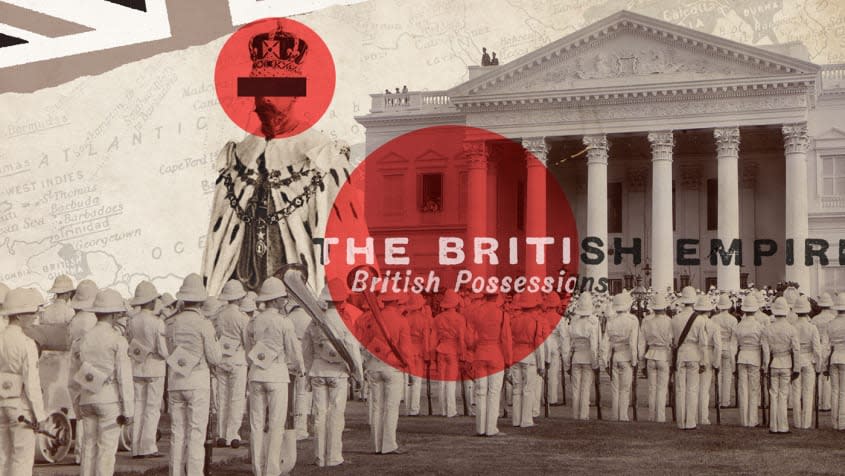Pros and cons of British colonial reparations

The British monarchy is entering a new era with the coronation of King Charles III. The king has pledged to be a transformational head of state, helping to bring the institution into the 21st century. A noted increase in diversity within the coronation ceremony itself, as well as Charles' commitment to climate change issues, may be indicative of where the crown is heading.
However, the royal family has long been at the center of criticism regarding the modern role of the monarchy. Protesters demonstrated across the U.K. in the leadup to the king's coronation. One of the most contentious issues remains the desire by some to see reparations given to former British colonies.
The U.K. has seen renewed calls for backpay to people whose ancestors were subjugated to the horrific realities of the British Empire. This includes a push for reparations to Caribbean and African nations, many of which were colonized, enslaved, and plundered. India and Pakistan have also sought $45 trillion in restitution from the U.K. However, the British government has often been passive in committing to this backpay, and some Britons don't feel they should pay for the actions of their ancestors.
Pro: It's morally correct
Reparations are not only about money, but "about the 'mass murder, the human suffering, the annihilation of spiritual, intellectual, and creative forces, which are without parallel in the history of mankind,'" Afua Hirsch writes for The Guardian, borrowing a parallel from Jewish reparatory justice claims.
Providing these reparations could help offset decades of wrongdoing, Hirsch adds, especially because "unceasingly since the 18th century, Black people have stated the case [for reparations] in petitions, correspondences, pamphlets, public speeches, slave narratives, and judicial claims."
Con: Reparations punish the wrong people
Even while seeking forgiveness, it must be recognized that "the past is past and that we must guard against some of the modern equivalents of imperial exploitation that are still amongst us," John McKenzie opines for BBC News, adding, "Economic growth and improvements in health and social life must come from aid, support, fair and free trade."
McKenzie also argues that in countries such as India, British companies "have indulged in a form of reparations" by using "'outsourcing' of such functions as 'call centers' which, together with its remarkable response to the opportunities of the latest digital technologies, has ensured that the balance has shifted in India's favor."
Pro: It would go a long way toward racial justice
British colonialism "resulted in an intergenerational legacy of trauma and inequities in key social indicators such as high incarceration rates and endemic poverty in affected Indigenous communities," Ali MC writes for Al Jazeera.
As a result, the heads of many former colonies have called for reparations to help balance racial hierarchies. A letter to Charles from 12 Commonwealth nations asks him to "commit to starting discussions about reparations for the oppression of our peoples, plundering of our resources, denigration of our culture and to redistribute the wealth that underpins the Crown back to the peoples from whom it was stolen." The U.K. should begin "a process to right the wrongs of the past and to continue the process of decolonization," the letter adds.
Con: Colonialism was in the past
While acknowledging atrocities is one thing, "we have become too trusting of activists who demand that we always accept the worst possible interpretation of our history," David Abulafia writes for The Telegraph. Any apology offered by former colonizers "should be on the basis of historical fact rather than supposition – especially when there are calls for financial compensation as well."
Even as European nations played the largest part in the slave trade, "the role of African rulers in capturing and selling the slaves cannot be ignored," Abulafia says. He adds that "paying out large checks will not alter the past," as important as it is to teach future generations about history's atrocities.
Pro: The U.K. and its former colonies could move on
Much of Great Britain still sees the colonial era as civilized, Luke Moffett, a researcher at Queen's University, tells PBS. As a result, "There's no real ownership of responsibility. So there is recognition that what happened in the past was bad, but we're not responsible now." Providing reparations would "[separate] the monarchy or British government from the past," Moffett adds.
Reparations "could change the destiny of the descendants of slavery in the Caribbean," Kenneth Mohammad writes for The Guardian. Financial aid could help prop up many poorer nations by bringing "real, impactful development initiatives in infrastructure, education, health and transportation."
Con: The process would be convoluted
One problem is that "it's not entirely clear to ordinary people in the Caribbean, what a demand for reparations would mean for them materially," David Scott, an anthropology professor at Columbia University, tells PBS.
Even British authorities have opined on this problem. Asif Ahmad, a former U.K. diplomat, tells Jamaican newspaper The Gleaner, "The reason why [reparations] will not prosper is because who do we pay it to? The people who were harmed directly are no longer here." Ahmad adds that a better solution would be to help countries like Jamaica through direct investments instead.
You may also like
MTV News shutting down after 36 years
Sen. Dianne Feinstein returns to D.C. after extended absence, Democratic tensions
Trump's loss to E. Jean Carroll was likely aided by these 2 blunders in his taped deposition

